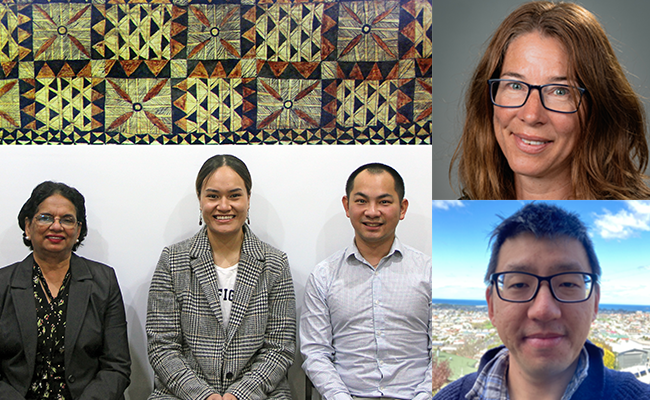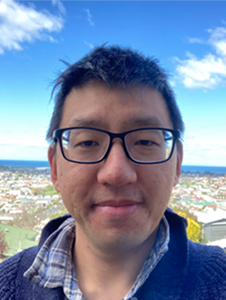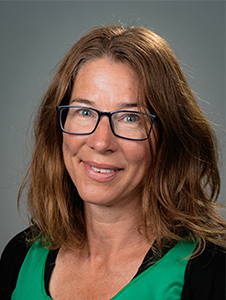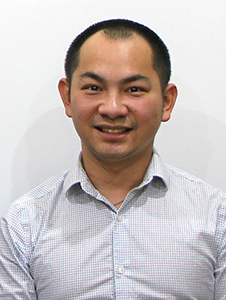
Grant recipients Dr Sarah Rhodes (top right), Dr Jerry Hsu (bottom right) and Dr Erik Wibowo (third from left, bottom left) with his project collaborators Dr Latika Samalia (left) and Saane Fakapulia.
Early and mid-career researchers (EMCR) have received a boost from the Division of Health Sciences with an Accelerator Grant.
Professor Roslyn Kemp, Associate Dean Research for the Division says the grants fill an important funding gap for these researchers, “These awards highlight the innovative and exciting research from early and mid-career researchers in the Division, with new ideas and independent research projects.”
Applications were reviewed by a panel of early to mid-career researchers from across the Division's different schools and offices.
Here we cover three of the sixteen successful applicants, some of the finest emerging researchers at Otago who are conducting vital research across the Health Sciences:
Dr Jerry (Che-Wei) Hsu - the modification of cognitive bias
Dr Jerry Hsu is a Lecturer with the Department of Psychological Medicine, Dunedin School of Medicine.

Dr Jerry Hsu
His research project, in partnership with Zaine Akuhata-Huntington, a Lecturer with the Kōhatu Centre for Hauora Māori, is in the modification of cognitive bias.
Dr Hsu explains that research has highlighted the role cognitive bias has in maintaining stereotypes and disadvantaging marginalised patient groups, such as indigenous populations, the elderly, and people with a disability.
“Research has also shown that when healthcare providers hold such biases, there is an increased risk of patients' developing both physical and mental health issues, and the patient and practitioner relationship is hindered. These biases can also impact medical decision making, access to treatment and interventions,” says Dr Hsu.
People are often unaware of their cognitive bias, making education in this area difficult. This EMCR Accelerator grant funding will be used for a project to develop and test a tool for medical students called Cognitive Bias Modification-Stereotype (CBM-S). The CBM-S tool is delivered online and can be self-administered without an educator present.
In this trial CBM-S will be used to address cognitive biases in relation to Māori patients. Medical students participating in the trial will be repeatedly exposed to ambiguous information, which they will only be able to resolve in a consistently non- stereotypical manner.
Dr Hsu says his motivation for this research comes as an educator: “As an educator at the Dunedin School of Medicine, guiding students to reduce the inequity gap experienced by Māori and other marginalized populations in Aotearoa NZ is of the utmost importance.”
Dr Hsu was born in Taiwan and grew up in New Zealand. He first trained as a computer scientist and electrical engineer and worked as a web developer before moving towards teaching. He was a primary teacher for 11 years, and then began research with a focus on the intersection between technology and people. He's also involved in another bias modification project with King's College London called Successful Treatment of Paranoia.
Dr Sarah Rhodes - researching the essential elements of a Long COVID clinic
Dr Sarah Rhodes is a lecturer with the School of Physiotherapy, and a qualified cardio-respiratory physiotherapist.

Dr Sarah Rhodes
Dr Rhodes is an advocate for the recognition and support of those living with Long COVID. She is involved with a Long COVID collective, and the cardio-respiratory special interest group within the Physiotherapy New Zealand, which has been instrumental in keeping up to date with the constantly emerging research and development of Long COVID services in Aotearoa.
“As a cardio-respiratory physiotherapist I recognise this profession has the skills and clinical experience to support those living with Long COVID in terms of symptom management and have been advocating for recognition of what our profession can offer,” Dr Rhodes says.
This Accelerator Grant funding will go towards researching the essential elements of a Long COVID clinic. The aim of this research into a Long COVID clinic is threefold.
Firstly, to merge the current evidence on multi-disciplinary management of Long COVID in primary care to provide a best practice guideline to inform the development of Long COVID services.
Secondly, to engage with people living with Long COVID and discuss aspects of a primary care clinic. The group wants to ensure broad representation of people living with Long COVID across Aotearoa in both urban and rural areas, and include equal number of Māori, Pacific Peoples, and non-Māori people. The team includes both Māori and Pacific members who will lead engagement with their respective communities.
Finally, the project will engage with health professionals and providers working in primary care including physiotherapists, occupational therapists, general practitioners, nurses, and Māori and Pasifika health providers to explore ways of delivering feasible multi-disciplinary care for the management of Long COVID.
“It is hoped this research will provide up-to-date evidence on the best practice management of Long COVID in primary care and contribute to a greater understanding of the needs of providers and those with lived experience of Long COVID in the delivery of primary care services,” Dr Rhodes says.
Dr Erik Wibowo – better understanding of and support for Pasifika students in Anatomy
Dr Erik Wibowo is a Lecturer for the Department of Anatomy, in the School of Biomedical Sciences.

Dr Erik Wibowo
He is collaborating with colleagues from the Department Dr Latika Samalia and Saane Fakapulia on this project to better understand the experience of Pasifika students in the Department of Anatomy, to be able to better support them.
Last year the research team ran a survey which identified various lifestyle, social, and academic factors that related to the academic stress of Pasifika students. More than 70 per cent of survey participants reported having insomnia symptoms, and about 30 per cent had some level of social anxiety as ethnic minority, which may potentially lead to them avoiding further academic study. These data are currently under review for publications.
This Accelerator Grant funding is for a follow up to that study. The team will explore Pasifika students' educational experience by assessing their perception on anatomy topics, preference of assessment types, and familiarity in using the University's learning resources. In addition, they will also collect information about their background, for example the pressure to study from family, whether English is their first language, financial distress, and the student's social life in Dunedin for example their level of engagement with Pasifika communities, and their loneliness level.
Lastly, considering the high proportion of students who reported insomnia symptoms in the previous study, the team will further investigate sleep-related measures, such as sleep quality, sleepiness level, preference of being a “morning” or “evening” person, and their psychological wellbeing.
